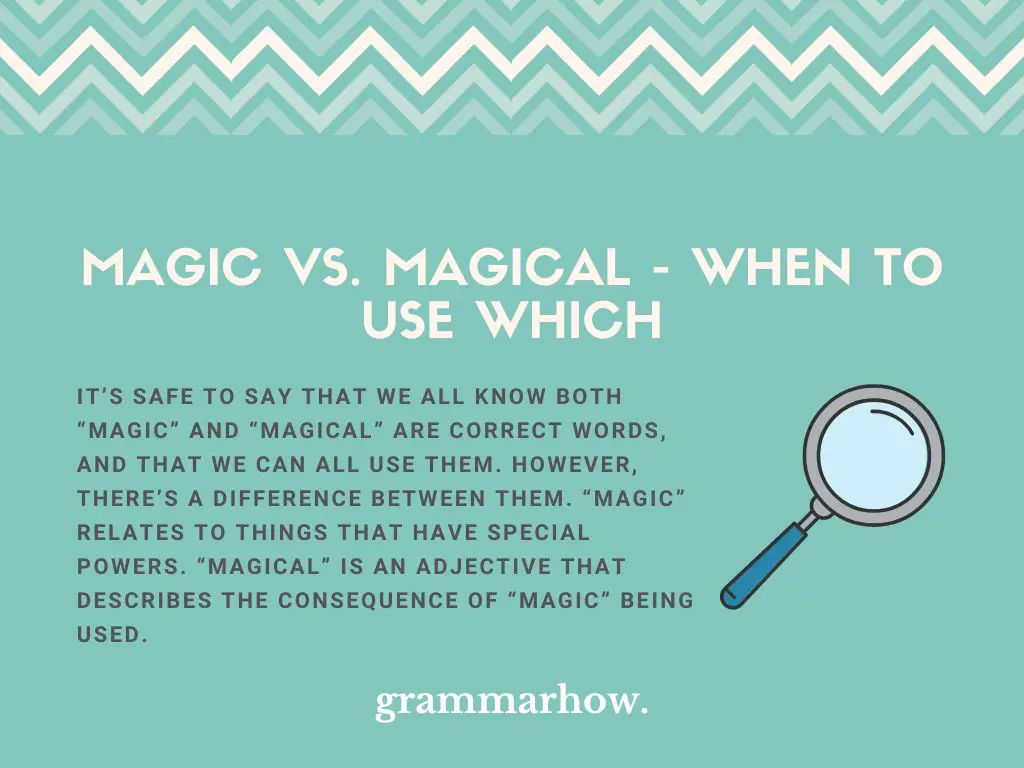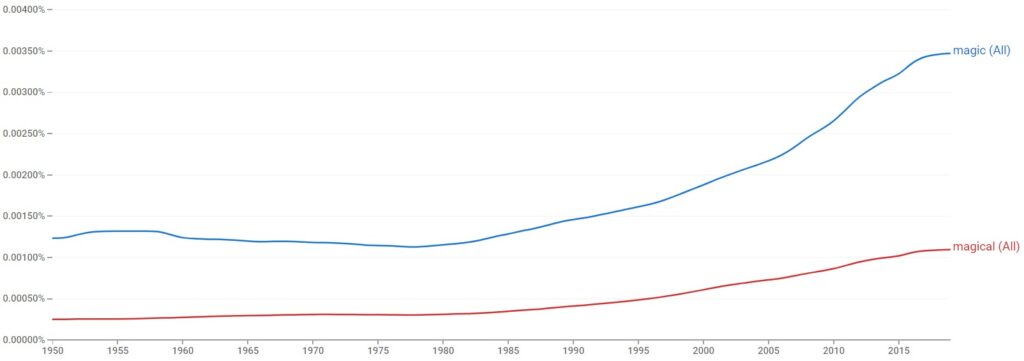“Magic” and “Magical” are certainly related to the same realm. But are those words the same in meaning? Can they be used interchangeably in the same sentence?
If not, how do we differentiate “Magic” from “Magical”? And do we use them in our daily lives? Let’s research and find out.
Magic vs. Magical – When to Use Which
It’s safe to say that we all know both “Magic” and “Magical” are correct words, and that we can all use them. However, there’s a difference between them. “Magic” relates to things that have special powers. “Magical” is an adjective that describes the consequence of “Magic” being used.

Let’s start by looking at some examples, and them let’s look at each word separately:
- Harry has a magic wand.
- Harry’s wand has magical powers.
- Peter will show us a magic trick.
- This beautiful city feels magical.
“Magic” is commonly used to describe things that have a “Magical” power. But let’s look closely at each of the words, and see what we can find out about them.
Magic
“Magic” is a special quality that makes something different from the ordinary. It’s often exciting or scary, especially when we use this word connected to the supernatural. But often, it’s just about things we cannot easily explain.
In The Cambridge Dictionary we find a similar definition. It also adds that “Magic” is the special power to make things happen that would otherwise be impossible.
Let’s see some examples of sentences with the word “Magic”:
- Children’s books often feature magic.
- Terry told me that this is a magic book, but I don’t believe him.
- It can be hard to convince kids that magic is not real.
- It’s not magic, honey. There has to be a reasonable explanation for it.
- You don’t need magic to solve this problem.
“Magic” is frequently attached to things that are impossible, or hard to explain. Also, “Magic” is more frequently used to indicate the thing that possesses “Magic” powers, as opposed to the consequences of it.
For example, a “Magic” book is the instrument that is supposed to generate “Magical” results. Just the same, the “Magic” kids believe exist is the vessel to create “Magical” results they imagine to be possible.
But “Magic” can also be used figuratively, as in “you don’t need magic to solve this problem”. This affirmation means the person can find a reasonable solution for the problem, which has no impossible solution.
Magical
“Magical” indicates a special quality, an exciting feature that makes something (or someone) different, and often, better than the others.
This is very similar to the definition found in The Cambridge Dictionary, indicating a quality that is out of the ordinary.
Let’s see some examples of sentences with the word “Magical”:
- The experience was magical!
- Dinner was magical, thank you for inviting me.
- Frankie is so intelligent that it’s almost magical.
- Petra’s look is ethereal, her beauty is magical.
- Many shows nowadays feature characters with magical powers.
“Magical” refers to the consequence of “Magic”. In other words, to use “Magic” will lead to a “Magical” result.
Also, “Magical” is frequently used in a metaphorical way. For example, likely there wasn’t anything actually “Magical” about the diner or the beauty described in the sentences. However, they were both so out of the ordinary and special, that it seemed fit to exaggerate and describe them as “Magical”.
Which Is Used the Most?
What is it that people talk more about: “Magic” or “Magical”? Which of those two words is more commonly used? We’ll find out by taking a look at a graph from Google Ngram Viewer.

For the longest time, “Magic” has been used with more frequency than “Magical”. Maybe the reason for this is that, besides the supernatural idea behind those words, “Magic” is also used for “magic tricks”, which is a very common form of entertainment.
In your opinion, why do you think “Magic” is more used than “Magical”?
Final Thoughts
“Magic” and “Magical” are certainly connected. Both refer to the power to make the impossible happen, but are used in different ways. Use “Magic” to describe the vessels or ways in which a “Magical” result is obtained. And use “Magical” to describe the consequences of putting “Magic” into action.
